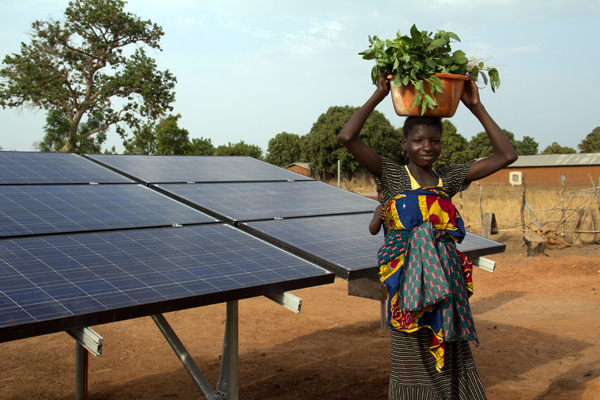Looking Towards Renewable Energy
This year, my company Global Wire Associates is focusing its website content on disparities in accessing the digital economy and how to bridge the gap among marginalized communities. There are two overarching issues that still restrict access. One issue is broadband access, which ITU Secretary-General Dr. Hamadoun Touré has declared a basic human right. The other issue is one that many of us in the West take for granted: access to electricity.
Approximately 1.6 billion people in the world are living without access to electricity. Electricity is still very unaffordable and unreliable in many parts of the developing world. Most of these people use wood, coal or even dung to heat and cook in their homes, which can result in indoor air pollution that kills 1.6 million people a year. Furthermore, those without regular access to electricity can’t recharge their electronics and participate on the Internet. Because so much of our lives – particularly employment and education – are largely dependent on technology today, it is not in anyone’s interest to be left behind in the digital economy.
Last week I met and talked with Dr. Richard Komp, founder of the solar energy firm SkyHeat Associates. He is one of the leading experts on solar technology and sustainable development. He started working with passive solar and radiant heating technologies in 1951, and has literally taught hundreds of workshops on the topic of Photovoltaics (PV) around the world.
Komp is a strong believer in solar energy bridging technological equality. He also practices what he preaches. He designed and built his off-the-grid Maine home with solar panels on top of it and a thermal hot water system more than thirty years ago. He says it allows him to lead a simple, inexpensive, and more fruitful life.
“I haven’t paid an electric bill in more than 25 years,” he said.
Komp has spread his solar knowledge with many people in Nicaraugua, Haiti, India and Zimbabwe over the years, building everything from solar cell phone chargers to biogas generating bathrooms. He was also involved with supporting Daniel Dembele, a young Malian man who started his own solar panel firm Afriq-Power. Dembele’s story was made into the documentary called Burning in the Sun.
President Obama recently promised US$7 billion for “Power Africa,” a new initiative to double electricity access on the continent. While any investment on this vital issue is welcomed, many analysts still have questions about the project, ranging from US$7 billion not being enough to the money really going into the pockets of Big Business.
There is also the issue that the initiative might come into conflict with Obama’s climate plans. Todd Moss of the Center for Global Development doesn’t see why electricity access and climate action have to conflict with each other.
“More than half the people in low-income neighborhoods in Nairobi and Dakar have no access to electricity,” Moss said. “For reaching urban centers and powering industrial zones, you’ll likely need traditional large-scale power plants. And current U.S. rules are keeping businesses out of that area.” However, he also said that clean energy solutions would make more sense in areas that are far off-the-grid.
There have been many efforts recently to look at large scale renewable energy solutions. The African Development Bank has embarked on an ambitious project to increase geothermal prospecting throughout East Africa. This is the process of drilling geothermal regions, where hot fluids drive turbines for electricity. The Bank will focus on building geothermal units in the East African Rift Valley.
Solar power is also being used to bridge the broadband divide. Microsoft announced in February that it was collaborating with the Kenyan government to deliver affordable, solar-powered broadband access through white space technology. Microsoft’s project is similar to one in South Africa just announced by Google, which uses three base stations for ten schools.
“You’re talking about delivering broadband access to communities without any electricity whatsoever, without paved roads; all these things we take as normal don’t exist in these communities,” said Paul Garnett, director of technology policy at Microsoft. “It’s exciting to be in schools where kids have never used the Internet before. Within 90 seconds they’re surfing the ‘Net, they’re using a touchscreen, and they’re off and running. It’s an amazing thing.”
Renewable energy isn’t the complete solution to electricity access, but it will contribute greatly in helping more people have better lives.

